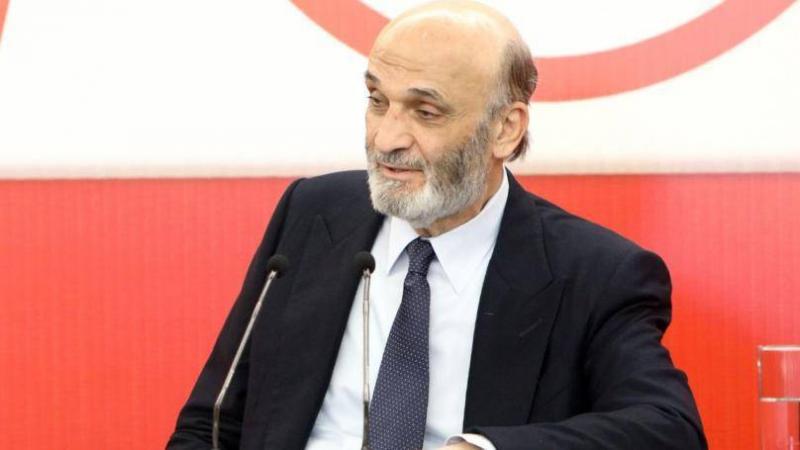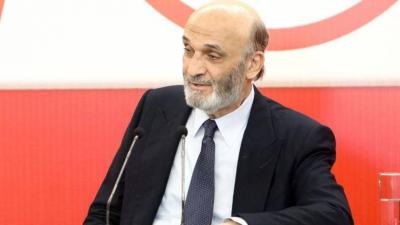The President of the Lebanese Forces Party, Samir Jaaja, revealed that the "Strong Republic" will respond to the call from Parliament Speaker Nabih Berri by proposing that he convenes an open session as soon as possible, provided that it is not a mere formality, and that it includes "all discussions." Jaaja spoke after a meeting of the "Strong Republic" bloc in Maarab attended by MPs including Kamil Shammoun, Ghassan Hasbani, Antoine Habshi, Shouki Daqash, Ziad Hawat, George Okais, Fadi Karam, Melhem Riachi, Elias Stefan, Jihad Baqradoni, Razi Al-Haj, Ghada Ayoub, Ghiath Yazbek, Nazih Matta, Said Asmar, former MPs Eli Kairouz, Antoine Zahra, Joseph Issac, Eddie Abi Lamaa, Imad Wakim, and Habba Qatiysha, as well as former ministers May Chidiac and Richard Kouyoumjian, party secretary general Emil Makrzel, bloc secretary Saeed Malek, executive committee members Raja Rassi and Eli Bragid, and the head of the media and communication department in the "Forces," Charles Jabour.
He pointed out that "in the past two days, we have been informed that President Berri is thinking about holding some sort of dialogue or consultation regarding the current crisis, so we gathered to discuss this proposal in light of the presidential elections that concern the country's situation." He stressed that "Lebanon's crisis can only be resolved through actual constitutional processes, foremost among them the presidential elections, as the election of a new president accompanied by the formation of a new government will begin the much-needed rescue process."
He remarked that "the Lebanese people are 'dying 100 times a day,' hence there is no escape from a rescue operation that needs its leaders and cannot be achieved with anyone. Therefore, the importance of electing the right president for this critical stage cannot be overstated." He continued: "When I learned about this dialogue, 'I wasn't very comfortable' because we are in the process of electing a president; what is the connection of dialogue to that? It is usually held when there are differing viewpoints on a subject, not during a presidential election period. I would have preferred that President Berri address the MPs who are boycotting the sessions and blocking the second rounds every time, asking them to refrain from obstruction, especially since the constitutional deadline is approaching and we need to move towards elections and vote for whom we want."
The "President of the Forces" emphasized that "constitutions are established to be implemented, and the quorum is set to be respected, which means that when the sessions are convened, all 128 MPs should participate, not using the constitution to evade the election process to prevent it from taking place." He expressed his regret over the manipulation of the law and constitution that has significantly contributed to the current woes.
He added: "After discussing the developments and fearing any attempts to obstruct or pass time without holding presidential elections, we will respond to the call through a proposal: that President Berri convene a session as soon as possible, provided that it is not a mere formality, which could include 'talk,' if it exists, among the blocs or their representatives concerning the presidency. This session should take the time it needs—in other words, it should be an open session that does not conclude until a president is elected. This is the only way to uphold the constitution and the constitutional entitlement without wasting time on other matters that are unrelated to our current crisis."
He viewed that "our crisis is related to electing a new president, particularly since we are three days away from the expiration of the constitutional time frame while a significant number of MPs are wasting opportunities for themselves, the Parliament, and the whole country." He stressed the need for President Berri's call to take this path to be productive by holding a session for consecutive elections to engage in meaningful discussions to resolve issues in order to reach the desired goal.
In response to a question, Jaaja argued that "if the other team genuinely intended dialogue and consultation, we had enough time for that before this period, especially since it does not require official forums and sessions. Therefore, there is nothing indicating their serious intention to agree on a specific name. On the other hand, this is an 'election process,' and anyone who wants to run should announce that and get voted for, as we and other opposition forces did by voting for MP Michel Moawad in previous sessions, and we will continue that."
He pointed out that "MPs must bear responsibility; they cannot continue voting with blank papers or burning names, as the Lebanese people elected them to address their problems." He called on President Berri to hold a session that does not end to place all MPs before their responsibilities, preventing them from continuing to submit blank papers or slogans but to choose a proposed name. He confirmed that "whoever reaches the presidency this way, we will salute them, whether we want them or not, given the existence of a constitutional mechanism to be applied."
Regarding talks about an international proposal to bring former Minister Sleiman Frangieh as president and Nawaf Salam as prime minister, he responded: "I have not heard about this proposal, and I wonder why they have not yet voted for Frangieh in previous sessions. If they want him, they should propose his name, and if he succeeds, he will have succeeded. It’s that simple."




